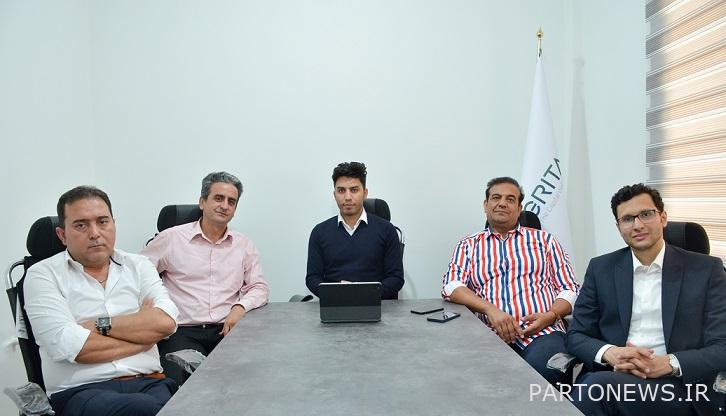Agrital, financing for agricultural projects using encrypted tokens

Agrital is a start-up business that wants to use the capacity of encrypted tokens to implement a fintech solution to solve the problem of financing the agricultural sector. Problem, technology and gender of the solution in Agrital It is relevant, diverse and scattered. This is the reason why the core of this collection is formed of people with the same diversity. Abolfazl Khalilpour has a doctorate in water resources management and after years of government work has decided to start a startup. Mehdi Adnani has a doctorate in rangeland science and is a member of the faculty of the Agricultural Research Organization. Ebrahim Nasiri, seminary activist فینتک And perhaps this aspect of Agrital’s work has fascinated him. Mehdi Nouri holds a PhD in economics and is a researcher in the field of blockchain. He seeks to see the product of his science in practice. Berdia Javadi has studied in the fields of software and information technology. He has been working in the startup ecosystem for several years and now he wants to test himself with a new challenge. To find out more about what brought these people together, we sat down with them:
What problem does Agrital solve?
Nouri: Agriculture is an important part of any economy and has a special place in our country. One of the serious problems of the agricultural sector is the lack of liquidity and weak financing mechanisms. Financing the agricultural sector should not rely on loans and facilities from government agencies.
Nasiri: Agrital seeks to solve the problem of financing for agricultural projects. This issue has been neglected so far and no serious solution has been proposed for it, but it can be hoped that based on the advances in financial technology, new solutions have been developed and used to solve this problem.
Nouri: At Egrital, we are developing a solution based on the crowdfunding model and blockchain technology, in which special tokens are defined as the means of financing agricultural projects.
Why is the problem of financing in agriculture important and where does it come from?
Khalilpour: In different sectors of the economy, the keyword security is used with different meanings. In the agricultural sector, the issue of food security is one of the basic needs of community growth. The annual production of agricultural products in our country is 120 million tons, while the consumption is 150 million tons. This is the difference between production and consumption in a situation where our per capita consumption is lower than other countries. So if we want to improve the situation in terms of per capita consumption, the gap between production and consumption will be greater. In order to be able to bring production closer to consumption and create self-sufficiency in some sectors, we need to increase production. This is not possible without solving the liquidity problem.
Khilipour: Many agricultural activities, such as preparing and selling an anthurium pot, can generate an annual profit of up to 60% for the investor, but at the same starting point due to insufficient capital available between production and sale, This activity does not develop. In Agrital, a token is issued for the capital provided to the farmer in the form of cash. Capital remains with the farmer for the period he needs to achieve his productive activity. On the other hand, if the investor needs his capital, he can sell the token to someone else and thus provide his liquidity. The use of tokens facilitates the process of investing in agricultural activities. It also expanded the scope of activities and made more people share in its benefits. In this case, we will have a wider, more diverse, more dynamic and better market.
Khalilpour: Agriculture in our country has more costs than what is happening in the world. Limited fertile plains, limited water resources, especially those resources that are available in the form of rivers and the division of land into small parts due to the law of inheritance are some of the high costs of agricultural production in Iran. In this situation, if we want to ensure food security, we must have programs to support farmers. In the past, the government participated in financing agricultural activities through lending, thus supporting farmers’ efforts, but today these loans have dwindled. That is why we emphasize mass financing, which involves a diverse range of investors.
Khalilpour: Sanctions are another problem that, like other sectors of the economy, has affected agriculture. A significant part of the value of the country’s agricultural exports is related to ornamental and summer plants, which are now facing difficulties in transferring their export revenues to the country. Digital currency can also solve this problem and remove the limitations.
What are the advantages of tokens in solving the financing problem?
Nouri: Since 2008, when blockchain technology attracted a lot of attention, we are witnessing new concepts and phenomena that are based on this technology and are emerging every day. Encrypted tokens are one of the types of asset tokens that have been developed along this path. The function of these tokens is that we are issued for a physical or virtual asset and people can buy it as proof of ownership of that asset. The cost paid for the token is used as capital in production, and when it comes to fruition, the token owner owns what is generated and shares in the profits from its sale. The token allows multiple individuals to participate in the financing of an agricultural activity, each owning a portion of its output. It can also be liquidated through transfer to others.
Javadi: The cryptocurrency market is very hot right now. Different strata, especially the youth, are active in this market in order to contribute to the growth of these markets. Agrital is presented as an investment opportunity in the same market, as a bridge, it directs capital towards an old industry, namely agriculture. With this role-playing, the capacity of young investors and risk-takers who are far from industries such as agriculture can be used to develop this part of the economy.
Are similar applications defined for this technology?
Optical: With the advent of blockchain and the development of tokens as a tool, applications for it have been defined in various fields. We also got acquainted with this technology and tried to apply it somewhere. We looked and realized that it could help solve the problem of agricultural financing. We came to the application and the problem from the study of technology itself. It was not like we first saw a business and wanted to create something similar.
What steps have you taken to identify potentially financing activities?
Khalilpour: At first, we have studied the flower and plant market and contacted the main producers in this field, which are mostly located in Tehran province. Of the approximately 7,000 greenhouses we have in the country with this issue, 60% are in Tehran, so this province is a very good starting point. We have serious interactions with suppliers and markets in this area and we have had agreements to start the implementation process of financing through token sales in this sector as soon as the programs are completed.
Does Agrital solve any other problem besides financing?
Adnani: Elimination of useless intermediaries is one of the goals of Agrital. The fact that we have tokens for agricultural products, in addition to facilitating investment, allows us to use tokens to make transactions related to that product on platform platforms, which reduces the number of intermediaries. The result is that the farmer gets a larger share of the final price and the consumer can buy the product at a lower price.
What challenges do you face?
Adnani: Knowing the people and farmers is one of the serious challenges. We need to explain the uses of technology to farmers and justify them to use it. However, some of them may not even be able to use the usual digital tools such as mobile phones and social networks.
What do you expect from government institutions and the government?
Adnani: We expect the Ministry of Jihad for Agriculture to play a supporting role in such activities. It is not possible to finance all agricultural activities within the ministry, but the ministry can help provide financial support to businesses operating in this field, to solve a problem that is also defined in its scope of duties.
What is the regulatory situation in the field in which you operate?
Nouri: We tried to choose an issue that has the least regulatory challenge. We have followed the part of the work that the regulator has formed and we have tried to comply with the regulations Collective financing (Crowdfunding), which is recognized and licensed by OTC, let’s move on.
Nouri: The essence of emerging technologies is that due to the positive and negative consequences they bring, the government needs time to make the space clearer and make better decisions, and this causes the regulator to delay the arrival of technology. And there will be challenges to reach itself. We hope that tokens will be regulated quickly and appropriately to facilitate the brainstorming, innovation and business development based on this technology. This technology is borderless and can help us to finance in addition to the inside.
How do you rate this article?


